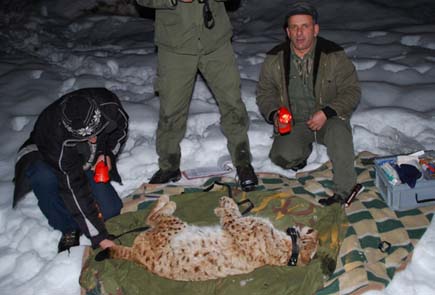Sensation in the Mavrovo National Park in Macedonia: for the first time, members of the environmental conservation organisation MES (Macedonian Ecological Society) and gamekeepers of the national park administration managed to catch a Balkan lynx in the evening of March 14th, 2010. They measured it and provided it with a GPS transmitter collar round its neck.

MES and the National Park staff members examine Balkan lynx „Marko“
© BLRPThis is a huge success for the lynx experts. So far, tracks in the snow, tufts of hair, taxidermised animals and photos have been the only proof that the Balkan lynx really exists. Balkan lynx “Marko”, how the research team named it, was again released to freedom immediately after the examination. Since then it roams the National Park freely and unflinchingly. The evaluation of the transmitted data of the first ten days shows that the technology is excellently suited to pursue the migration of this timid animal in the impassable territory. The researchers hope to gain important insight into the ecology of this highly endangered subspecies of the Eurasian Lynx. Knowledge about the current circulation and migration routes of the Balkan lynx is a prerequisite to take effective protection measurements like – for example – to designate in a more precise way the borders of the protected areas.
The Swiss organisation KORA (coordinated research organisation for large predators in Switzerland) oversees field studies from a scientific point of view, aiming at the condition and ecology of the Balkan lynx in the border area of Albania and Macedonia, and executes them with local Macedonian and Albanian project partners. The research results are an important contribution to the “Balkan Lynx Recovery Programme” (BLPR); a programme for the protection of the Balkan lynx carried out by EuroNatur in cooperation with its partner organisations KORA, MES and PPNEA (Preservation and Protection of Natural Environment in Albania).
Read more about EuroNatur’s activities to protect the Balkan lynx


